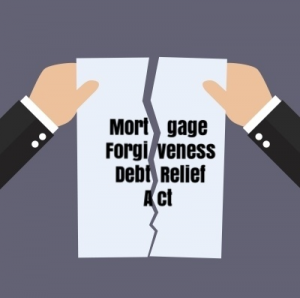When You Can Avoid Paying Income Tax on a Forgiven Mortgage
As discussed in “Strategies for Avoiding Foreclosure”, if you sell your home in a short sale or return it to your lender by providing a deed in lieu of foreclosure, you still could be responsible to pay income tax on the forgiven mortgage.
Historically, forgiven debt (also known as cancellation of debt income or “COD”) had to be included in a taxpayer’s gross income for tax reporting purposes unless it (1) occurred in a Title 11 bankruptcy case, (2) occurred when the taxpayer was insolvent, (3) was a discharge of qualified farm indebtedness, or (4) was a discharge of qualified real property business indebtedness.

A key feature of the Act is that taxpayers do not have to pay federal income tax on up to $2 million ($1 million for married individuals filing separately) of debt forgiven for a loan secured by their principal residence if the forgiven debt meets certain criteria. The criteria to qualify for this principal residence exclusion are as follows:
The Criteria
1. This exclusion only applies to debts discharged from January 1, 2007 to December 31, 2009.
2. The exclusion applies to qualified principal residence indebtedness, which is the original purchase price, plus improvements, of the taxpayer’s principal residence. It doesn’t apply to discharges of second mortgages or home equity loans, unless the loan proceeds were used to acquire, construct, or substantially improve the taxpayer’s principal residence.
3. If the amount of the original mortgage is more than the cost of any substantial improvements, only the debt that is not more than the cost of the principal residence plus improvements qualifies for the exclusion.
4. Refinanced indebtedness qualifies to the extent it doesn’t exceed the amount of indebtedness being refinanced (i.e. cash-outs don’t qualify for the exclusion).
5. The exclusion only applies to forgiven debt on a taxpayers’ principal residences not second homes, vacation homes, business property, or investment property. A taxpayer can only have one principal residence. It is the place where the taxpayer ordinarily lives most of the time.
Final Thoughts
This principle residence exclusion can be a tremendous benefit. However, if you are eligible, keep in mind the following:
1. Taxpayers report COD income, including whether it is subject to a exclusion, on IRS Form 982, Reduction of Tax Attributes Due to Discharge of Indebtedness (and Section 1082 Basis Adjustment), which is filed with the Taxpayer’s federal income tax return.

3. If only a part of discharged debt qualifies for the principal residence exclusion, the remainder of the discharged debt may qualify for another exclusion under 26 USC § 108 of the Internal Revenue Code (Income from Discharge of Indebtedness).
https://web.archive.org/web/http://www.realestatelawinmichigan.com:80/2008/12/when-you-can-avoid-paying-income-tax-on.html

